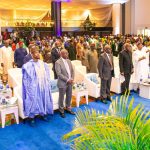By Barnabas Esiet.
The Manufacturers Association of Nigeria (MAN) has voiced its concerns regarding the Monetary Policy Committee (MPC)’s decision to increase the Monetary Policy Rate (MPR) to 27.25%, citing potential negative impacts on the manufacturing sector.
This rate hike marks the fifth consecutive increase this year, with the MPC, spearheaded by the Central Bank of Nigeria’s (CBN), aiming to curb inflationary pressures despite signs of moderating inflation.
The MPC’s decision, which was announced after the its meeting on September 23-24, 2024, is expected to have far-reaching implications for the manufacturing sector.
According to the CBN, the decision was influenced by emerging inflationary pressures stemming from rising fuel, electricity, and food costs, despite a slowdown in inflation rates over the past two months.
Notably, the Nigerian government’s 41% increase in the pump price of Premium Motor Spirit (PMS) in August contributed to these pressures.
MAN in a statement signed by the Director General, Segun Ajayi-kadir, warns that the continued interest rate hikes will exacerbate challenges faced by manufacturers, including rising production costs and declining consumer purchasing power.
“With borrowing costs exceeding 35%, manufacturers will struggle to expand production capacity, invest in new product lines, and maintain competitiveness.” Ajayi-kadir noted.
The association cites alarming statistics, including a 42.93% surge in unsold finished goods inventory, reaching ₦1.24 trillion, and capital expenses exceeding ₦730 billion due to rising interest rates.
These trends threaten not only the manufacturing sector but also Nigeria’s economy, potentially leading to business closures and reduced employment opportunities.
MAN urges the government and CBN to adopt a holistic approach to policy formulation, prioritizing the survival and growth of the manufacturing sector.
The association recommends conducting a comprehensive review of rate hikes’ effects, promoting domestic production, strengthening monetary-fiscal collaboration, and introducing fiscal measures to support manufacturers.
Specifically, MAN advocates for accelerating the disbursement of the N1 trillion single-digit loan, introducing concessionary rates for essential raw materials and technology imports, encouraging backward integration and local sourcing, promoting renewable energy investments, and utilizing subsidy reform savings to improve industrial infrastructure.
By reconsidering the rate hike and exploring alternative measures, the CBN can support Nigeria’s productive sector, alleviate poverty, and promote economic growth.









Comment here